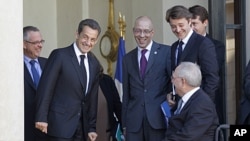Finance ministers and central bankers from the Group of 20 leading economies are in Paris Friday and Saturday to find ways to strengthen the world's ailing economy and staunch Europe's financial crisis.
Related Story by VOA's Al Pessin
Europe received one piece of good news this week as Slovakia became the last country to ratify expanding a key bailout fund for shaky economies in the 17-nation eurozone. Internal bickering within Slovakia's parliament derailed approval of the measure earlier this week.
The eurozone's financial crisis is expected to top the agenda of the Group of 20 finance ministers and central bankers meeting in Paris Friday and Saturday. They will be looking for ways to get the world's sluggish economic recovery back on track. And they will be pressing China for a faster appreciation of its currency.
European leaders are pressured to come up with solutions quickly to their sovereign debt crisis that is threatening the stability of a number of banks and risks further slowing global recovery.
On Wednesday, European Commission President Jose Manuel Barroso outlined a five-point plan to address these problems.
"We are really speaking seriously when we mention the need for more discipline, more integration. It means more Europe - I think that should be the goal of all of us," he said.
The leaders of Europe's two biggest powerhouses, France and Germany, have also vowed to come up with a sustainable, long-term solution to the crisis before a key summit early next month of G20 leaders.
But so far, many experts have criticized European leaders for being slow to address an economic crisis that began with Greece and has spread to other shaky economies.
Even the expanded bailout fund is considered a stopgap solution. Not only must Europe curb its debt, says Philippe Moreau Defarges, an analyst for the French Institute of International Relations, but it must find ways of growing its economy.
"We could have a disaster," he said. "Europe could have a disaster. It's clear that there will be new negotiations about a bigger European fund. It's clear the present European fund will not be enough. They will need more money. And maybe a kind of eurobond."
Moreau Defarges believes that over time, a number of European countries may not be able to pay back their debt. Not just Greece, but also Italy - Europe's third largest economy - and possibly even France.
The week is ending with more bad news for Europe, as Standard & Poors downgraded Spain's long-term credit rating. And top European economic institutes predicted a major slowdown in the growth of Germany, Europe's largest economy.
















